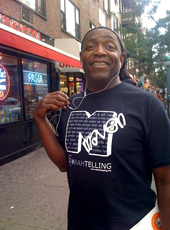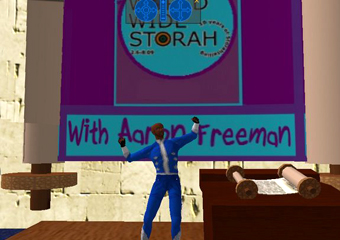Torah Tales
Permanent link All Posts

Storahteller Aaron Freeman
Aaron Freeman recently added another line to his already lengthy resume: Torah maven, the traditional storyteller who translated the Hebrew Torah into local language. The comedian, radio personality and author says his latest professional incarnation is a natural progression of his love for all things Jewish. He wants to tell great stories, and there isn’t a better story than Torah, he says.
“We who spend a lot of time reading and interpreting the Torah see it as the most interesting, fascinating stories,” Freeman said on the eve of his first cyber performance in the virtual Second Life environment, where he’s known as Joyous Pomegranate. “And they are even more astonishing the third or fourth time you hear them. The story we thought we were telling three years ago could not be more different from the exact same story we’re telling today. Every year I go, ‘I can’t believe I missed that.’”
Freeman’s Second Life performance was part of Worldwide Storah, a weekend dedicated to the art of Torah translation. Storah is a method of bringing Torah stories alive through simultaneous translation from Hebrew into the vernacular – mostly English among the recent crop of Torah mavens. In addition to the Second Life event, Worldwide Storah hosted events in London, Jerusalem, Miami, New York City, L.A. and eight other cities Feb. 6 through 8.
Amichai Lau-Lavie, an Israeli-born teacher of Judaic literature and a performance artist, revived the lost art of Torah translation and re-imagined it in a twenty-first century way as Storahtelling. The roots of Storahtelling lie in the translations that accompanied traditional synagogue Torah services until the early Middle Ages. For almost two millennia, Hebrew was primarily the language of ritual, and congregations needed translators to convey the meaning of the passages.
Freeman, who was one of the first to adopt Storahtelling techniques, recently became a congregational Torah maven, the official Torah meturgaman (translator in Aramaic), at his congregation, Aitz Hayim Center for Jewish Living in Highland Park.
Storahtellers bring their own skills and preferences to the translation. Freeman, who composes his own translations, treats each portion differently depending on the content. Sometimes he might involve the congregation, asking members to stand in for the pharaoh and Moses, for example. Other times, he takes a more direct storytelling approach, using intonation, facial expressions and gestures to help convey the meaning. Freeman also draws some inspiration from the Torah-based comic strip he created with his wife, artist Sharon Rosenzweig.
For his duties as a Torah maven, Freeman often wears traditional Persian garb in reference to the Persian roots of Torah translation. He couldn’t find a Persian costume in the virtual world, though, so his Second Life avatar – “a fairly athletic black guy” – sported dark blue Moroccan kaftan and trousers.
In his Feb. 8 Second Life ritual, Freeman used a pre-recorded Hebrew version of Parashat Beshalach, which tells about both the parting of the Red Sea and the first gift of manna. He then translated the text of the Torah portion. He guided his avatar using the keyboard and spoke into a microphone mounted on his computer. Although the figurine couldn’t recreate Freeman’s usual highly animated facial expressions, it conveyed some of the story via gestures Freeman assigned to it. Freeman says guiding the avatar is akin to performing a marionette show.

Freeman’s avatar led a Torah service in the cyber environment Second Life Feb. 8, marking the first time a Torah service had been performed in virtual reality
Even when he doesn’t have to guide an avatar, Freeman finds each Storahtelling ritual demanding.
Biblical Hebrew provides a unique challenge: Jewish sages have debated the meaning of certain Hebrew words for centuries, so some interpretation is always necessary.
“Every translation is a commentary,” Freeman says. “There is no such thing as a literal translation of biblical Hebrew.”
Humor and a basic belief in positive outcomes help overcome some of the challenges, Freeman says. An observant Jew who grew up Catholic, Freeman has forged a steadfast connection to Judaism because “Jewish observance ameliorates the worst aspect of American life for me. The consumer culture makes us endlessly aware of what we do not have without counterbalancing it with gratitude for the mind-numbing bounty that we enjoy,” Freeman says. Jewish observance requires the constant expression of gratitude for everything – from a glass of water or a piece of bread to having woken up and being healthy. That makes Freeman “guaranteed to be happy; you can’t be grateful and pissed off at the same time,” he says.
Freeman is also grateful for Fridays. “How can you not love a religion that has a mandatory party every week? For the Jews, eating drinking and partying every Friday is not just a good idea, it’s the law. Got to love that!”



.jpg)



